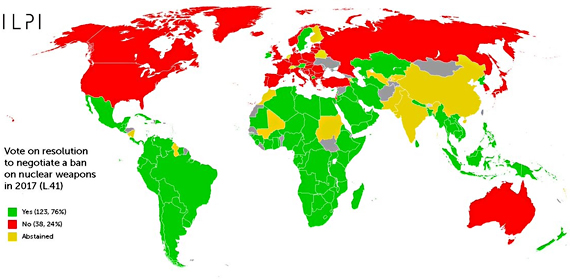
I wrote yesterday to begin a conversation about possible ways that the treaty prohibiting nuclear weapons may come to dominate the global discourse in the months ahead.
An extremely important question is how China will engage with this new development. People frequently assume that China is a country trying to catch up with and surpass the United States, and so China’s behavior in the world must necessarily be a near version of how the US behaves. However, a growing school of thought has begun to notice that the best way to understand what China might do is to ask, “What could China do that in one fell swoop would put them three steps ahead of the US?”
China declined to participate in the negotiations on the nuclear ban treaty. Observing that decision, I began to realize that China’s involvement in the process could at the right moment carry enormous weight, and would certainly be calculated to maximize the benefit to China. (See “China DOES Have a Role in the Nuclear Ban Movement.”)
It’s important to remember that China played an important role in defining a post-World War II world in which the countries of Asia, Latin America, and Africa need not be dominated by the US, Europe, and Russia (then the Soviet Union) – despite the threat posed by the latter countries’ nuclear weapons. Yes, China has nuclear weapons. But a quick review of the size of China’s nuclear force suggests that, unlike the US and Russia, China does not believe that strength comes from having nuclear weapons. So where does China seek strength?
I propose a thought experiment: Imagine that China deems the advent of a global treaty prohibiting nuclear weapons (with 50 or more signatory nations), together with the resulting impact on the global security discourse, to offer an advantageous moment to make a bold move. Imagine, further, that China declares its intention to accede to the nuclear ban treaty, together with a definitive timeline – say 5 years – for dismantling its nuclear arsenal. What might be some of the possible outcomes of such a move?
First, in the general sense of “global leadership,” it would be a stunning complement to the role now being accorded to China in the global effort to address global warming (particularly in light of US abandonment of the Paris Accord).
Second, in the realm of “optionality,” it would give China enormous control over its ability to tell its story to the world over the coming five (or however many) years. China would have obtained the option to volunteer progress reports in the years ahead on its work toward fulfilling its unprecedented promise.
Third, it could have particular benefit for China’s relations with other countries that support the nuclear ban. For instance:
- China’s relations with other countries bordering the South China Sea are vitally important. Vietnam, the Philippines, Malaysia and Indonesia were among the sponsors of the nuclear ban treaty initiative when it was first put forward in October, 2017, and have been strong supporters throughout the process.
- Supporting the nuclear ban would be a way of building bridges with the countries of Latin America – including original ban sponsors (and Pacific neighbors) Mexico, Guatemala, El Salvador, Honduras, Costa Rica, Panama, Venezuela, Ecuador, Peru, and Chile. In fact, Latin America has a 50-year history of working toward a global nuclear ban.
- And, of course, it has long been apparent that China is busily building relations with countries throughout Africa. Nearly every country in Africa is a supporter of the nuclear ban.
Fourth, there is the potential for shaking loose other “holdouts”:
- Australia has opposed the ban, but is a vital trade partner with China. And 75% of the public in Australia support the ban.
- China has been moving progressively toward playing the principal role in negotiating some kind of grand bargain to denuclearize/demilitarize the Korean peninsula.
Finally, in the long run, there will be a solution to the countries that refuse to come to the table: India and Pakistan, the US and Russia. While it may be difficult today to imagine that it will be China that will one day play the “honest broker” and host such talks . . . it is not difficult to imagine people saying “this wouldn’t have been possible without China.”
Of course, everything outlined above is hypothetical. But I believe it illustrates an important point: the impending nuclear ban treaty carries enormous potential consequences for many countries – China being just one example – and the more people delve into the risks, opportunities, and possibilities involved, the more global excitement there will be about the treaty.
Reprinted with permission from Scarry Thoughts.




You do realize that a Chinese led world hegemony isn’t exactly attractive to people that value democracy and freedom, right?